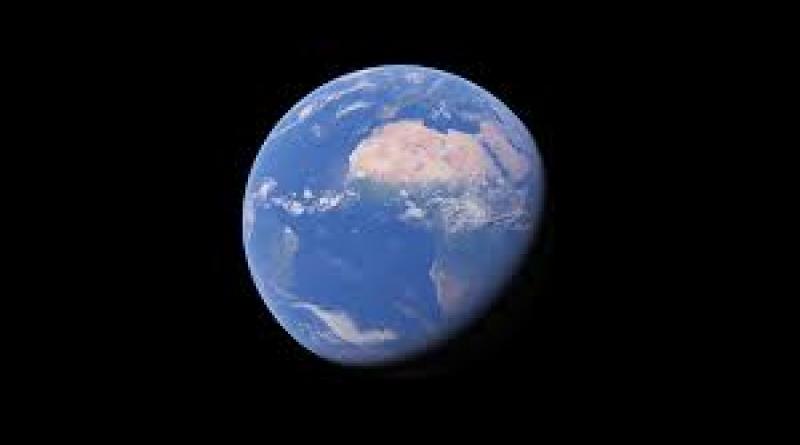Our Home in Ruins.

What are we thinking? Oh, right. We’re not.
Standing on the moon, I see the battle rage below.
Standing on the moon, I see the soldiers come and go.
~ Jerry Garcia & Robert Hunter
When I look at the world today, I see chaos, greed, misdirection, hostility, senselessness, fear, anguish, repression, depression, aggression, conflict, irresponsibility, avoidance, denial, selfishness … BIG problems.
I see military machines balancing on a thin wire of humanity, economies artificially propped up to favor the top echelons while the masses struggle below, and nations jostling, diplomatically or otherwise, for an upper-hand. Power struggles define us at every level, from our bedrooms to the boardrooms and from the oval office to the United Nations.
Meanwhile, as the balance of power shifts, maneuvers, overcomes, reacts, defends and defeats, the chessmen remain on the same board. Stepping back, it’s easy to see our useless micro-battles are being fought at the expense of our common goal of continuing to exist on this planet.
The result of our ruinous games is the destruction of the playing field.
Already much of Earth’s natural resources are gone — its beauty lost some decades before. Our planet’s virgin land was first occupied by respectful natives, but then overtaken by the far-reaching greed of explorers and settlers, stripped by the Industrial Revolution, and abused daily by each and every invader who takes for granted its very existence.
As forests dwindle, temperatures rise, glaciers melt, sea levels swell, lakes clarify from acid, skies darken with pollution, landscapes sterilize under the blanket of technology, and populations grow unsustainably, the Big Blue is no longer as such.
Standing on the moon, where talk is cheap and vision true.
~ Jerry Garcia & Robert Hunter
Problems … Questions … Answers? … Choices.
We must choose to become aware, to get informed, to show concern, to stay motivated, and to act decisively with regard to the condition of our home.
Alternatively, we have the option to retreat into our small niche and claim all else is beyond our control. We can pretend disaster will not filter down to our tiny chunk of Earth and assume that if catastrophe does visit, it will not be in our lifetime.
As individuals, that doesn’t sound so bad. As prospective parents, however, that sentiment is more frightening than the reality of destruction today. Given that most parents hope for a better life for their children than that which they have endured, one would think more concern would exist. It is disheartening to think that new lives conceived in love, joy and happiness may one day end in environmental disaster and human holocaust.
Now one might ask, is the joy of life, even in this disintegrating world, worth the pain of an early and unnecessary death? In other words, should we even be having children? Will those children live in a world even further destroyed by our collective unconsciousness and inaction?
Or will Earth persevere? Will nature rebound and recover on its own? Will technology provide solutions currently unthinkable? Will future generations thrive in spite of the seemingly insurmountable challenges?
Maybe the problems of this world are no worse than those of previous times. Did the decades-long cold war make nuclear annihilation seem inevitable? Did the carefree, leather-jacketed days of the 50s have their own hidden problems? Was there hope for a rebuilt society during the darkest days of WWII? How about the fancy-free 20s roaring towards the depression, the feudal days of the aptly named Dark Ages, or the unenlightened days before a man called Jesus Christ?
Has mankind always faced extinction in one form or another?
Haven’t we always found a way to survive?
Maybe so, but we should be responsible enough to consider the consequences of less desirable outcomes. Besides, there is no rational counterpoint to taking preventative measures because even if the science is somehow wrong, what have we to lose by behaving like our survival depends on it?
What’s stopping you from making a difference?
Standing on the moon, where talk is cheap and vision true.
~ Jerry Garcia & Robert Hunter
Problems … Questions … Answers? … Choices.
We must choose to become aware, to get informed, to show concern, to stay motivated, and to act decisively with regard to the condition of our home.
Alternatively, we have the option to retreat into our small niche and claim all else is beyond our control. We can pretend disaster will not filter down to our tiny chunk of Earth and assume that if catastrophe does visit, it will not be in our lifetime.
As individuals, that doesn’t sound so bad. As prospective parents, however, that sentiment is more frightening than the reality of destruction today. Given that most parents hope for a better life for their children than that which they have endured, one would think more concern would exist. It is disheartening to think that new lives conceived in love, joy and happiness may one day end in environmental disaster and human holocaust.
Now one might ask, is the joy of life, even in this disintegrating world, worth the pain of an early and unnecessary death? In other words, should we even be having children? Will those children live in a world even further destroyed by our collective unconsciousness and inaction?
Or will Earth persevere? Will nature rebound and recover on its own? Will technology provide solutions currently unthinkable? Will future generations thrive in spite of the seemingly insurmountable challenges?
Maybe the problems of this world are no worse than those of previous times. Did the decades-long cold war make nuclear annihilation seem inevitable? Did the carefree, leather-jacketed days of the 50s have their own hidden problems? Was there hope for a rebuilt society during the darkest days of WWII? How about the fancy-free 20s roaring towards the depression, the feudal days of the aptly named Dark Ages, or the unenlightened days before a man called Jesus Christ?
Has mankind always faced extinction in one form or another?
Haven’t we always found a way to survive?
Maybe so, but we should be responsible enough to consider the consequences of less desirable outcomes. Besides, there is no rational counterpoint to taking preventative measures because even if the science is somehow wrong, what have we to lose by behaving like our survival depends on it?
What’s stopping you from making a difference?
Side note: I worked as an optical engineer for many years. When people asked me what I did for a living, what an optical engineer does exactly (You make eyeglasses? Um, no.), I said I designed cameras for space, like your Canon or Nikon, but much bigger and far more expensive. The VIIRS satellite was one of my designs, so I suppose the image attribution above could read “Photo by author.”
7 January 2021
Medium


